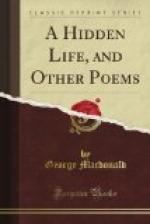Greetna,
father, that I’m gaein’;
For
ye ken fu’ weel the gaet:
Here,
in winter, cast yer sawin’—
There,
in hairst, again ye hae’t.
What of the lady? Little more I know.
Not even if, when she had read the lines,
She rose in haste, and to her chamber went,
And shut the door; nor if, when she came forth,
A dawn of holier purpose shone across
The sadness of her brow; unto herself
Convicted; though the great world, knowing all,
Might call her pure as day—yea, truth itself.
Of these things I know nothing—only know
That on a warm autumnal afternoon,
When half-length shadows fell from mossy stones,
Darkening the green upon the grassy graves,
While the still church, like a said prayer, arose
White in the sunshine, silent as the graves,
Empty of souls, as is the tomb itself;
A little boy, who watched a cow near by
Gather her milk from alms of clover fields,
Flung over earthen dykes, or straying out
Beneath the gates upon the paths, beheld
All suddenly—he knew not how she came—
A lady, closely veiled, alone, and still,
Seated upon a grave. Long time she sat
And moved not, “greetin’ sair,”
the boy did say;
“Just like my mither whan my father deed.
An’ syne she rase, an’ pu’d at something
sma’,
A glintin’ gowan, or maybe a blade
O’ the dead grass,” and glided silent
forth,
Over the low stone wall by two old steps,
And round the corner, and was seen no more.
The clang of hoofs and sound of carriage wheels
Arose and died upon the listener’s ear.
THE HOMELESS GHOST.
Still flowed the music, flowed the wine.
The youth in silence went;
Through naked streets, in cold moonshine,
His homeward way he bent,
Where, on the city’s seaward line,
His lattice seaward leant.
He knew not why he left the throng,
But that he could not rest;
That something pained him in the song,
And mocked him in the jest;
And a cold moon-glitter lay along
One lovely lady’s breast.
He sat him down with solemn book
His sadness to beguile;
A skull from off its bracket-nook
Threw him a lipless smile;
But its awful, laughter-mocking look,
Was a passing moonbeam’s wile.
An hour he sat, and read in vain,
Nought but mirrors were his eyes;
For to and fro through his helpless brain,
Went the dance’s mysteries;
Till a gust of wind against the pane,
Mixed with a sea-bird’s cries,
And the sudden spatter of drifting rain
Bade him mark the altered skies.
The moon was gone, intombed in cloud;
The wind began to rave;
The ocean heaved within its shroud,
For the dark had built its grave;
But like ghosts brake forth, and cried aloud,
The white crests of the wave.




